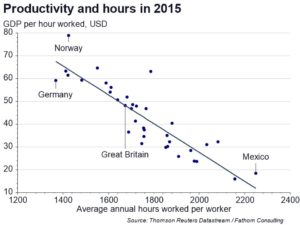A sideways look at economics
A chart has been doing the rounds among Fathom staff. It shows a strikingly close relationship between the average hours worked per worker across the major economies, and the output per hour of those workers. The longer people work, it seems, the less productive they are. A number of our employees have even argued that this should cause Fathom management to reduce the length of the working week.
Admittedly, the correlation is remarkably high. Have we stumbled across a solution to the productivity crisis? Work fewer hours, and output per hour will rise? Probably not. If pushed to extremes, people will undoubtedly become less productive. Someone who works twenty hours each day is bound to produce less per hour than someone who works five hours each day. We take that as given. But there is something else going on in this chart.
As an individual becomes better off, as their output per hour rises, then given a choice they will adjust the number of hours that they work. As any student of A-level economics will tell you, an increase in one’s own productivity leads to a substitution effect, and an income effect. The substitution effect says that consumption has become cheaper. One can produce more, and therefore consume more, for each hour that one chooses to work. Work has become cheap relative to leisure. The income effect works in the other direction. It says that by working the same number of hours as before, one is better off than before. Rationally, a portion of this increase in income will be spent on buying more leisure – working less in other words. Empirically, the income effect dominates the substitution effect. That is why there is a long-term downward trend in average hours worked across the major economies. And it is why workers in less well-off countries like Mexico work longer hours than workers in better-off countries like Norway.
There are two relationships at work in our chart. There is, if you like, an exhaustion effect, which says that the more hours you work, the less you produce per hour. But there is also a wealth effect, which says that the more you produce per hour, the fewer hours you will choose to work. Which effect dominates? In principle, one can answer that question using appropriate econometric techniques. But it is far from straightforward, and it is not an exercise for a Friday afternoon. Suffice to say that Fathom is not yet minded to cut the length of the working week.
